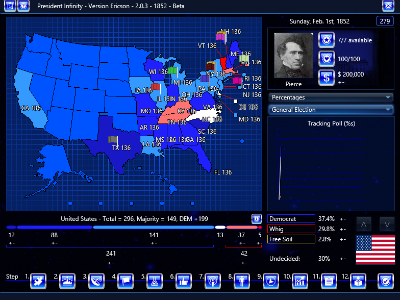*This scenario was updated greatly by the Historical Scenario Commission on July 27, 2017. Version 2.0 can be downloaded here: United States – 1852 v. 2.0
This election takes place two years after the Great Compromise, which delayed the Civil War by ten years. At the time, many thought it could achieve a permanent fix; however, taken by president from 1852-1860 quickly undid this legislation. The three great senators of the 19th century, Henry Clay, Daniel Webster and John C. Calhoun, all worked to keep the union together by advocating this legislation. Each took a hit to their reputation for their bipartisanship. Stephen A. Douglas, one of Lincoln’s rivals, played an important part by organizing the Compromise in a way that would allow it to pass.
Unfortunately, the 1852 election was a dawning of a new age. Calhoun had recently died, Clay would be dead mid-year, and Webster towards the end of the year. A new generation of politicians was emerging. Another recent death was that of President Zachary Taylor, who said he would not sign the compromise and then would go to war with any state that seceded. After Taylor’s death, Millard Fillmore signed the document. Despite Fillmore coming together with Congress, he is unable to win over people within his own party or voters to the Whig banner. The election looks to be a shoe-in for the Democrats.
For the Whigs, with Fillmore loosing support for reelection, the Whig Party turns once again to a hero of the Mexican War. This time it is Winfield Scott, arguably the most impressive general in US history, when considering his successes. At 6’5″ and nearing 300 lbs, he would be the largest president if elected. However, he lacks polish as a politician. Another challenger is the ailing Daniel Webster, who is strong only in his New England stronghold.
The Democrats have two front-runner, the expansionist Lewis Cass, whow as the nominee in 1848, and James Buchanan, who is favored in the South and in Pennsylvania. William Marcy, Stephen A. Douglas and Sam Houston are also candidates. Deep in the shadow is Franklin Pierce, who hopes to emerge as a compromise candidate that is suitable to Southerners, expansionists and Northerners.
The Free Soil Party, led by John P. Hale, is the party for abolitionists.
The election allows for many what-if scenarios:
- What if the rising Whig William H. Seward ran?
- What if a well-known compromisor, John J. Crittenden, ran for the Whig ticket?
- What if former Rep. Abraham Lincoln ran before he developed a name for himself as an orator?
Feedback is desired. The costs for barnstorming, etc appears to be off. If anyone can help me figure out the best dollar level for the campaign actions, then it would be helpful. Thanks.

